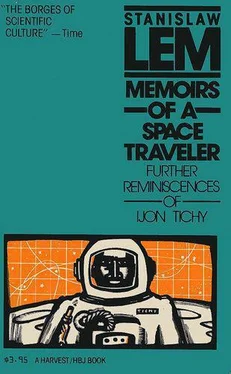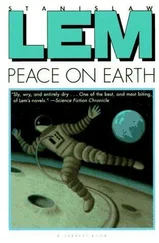The last compartment was provided with two grilles separated by some two feet of open space. One finds such grilles on the cages of particularly ferocious animals, to keep unwary people from approaching too closely and being clawed. Diagoras halted, put his face up to the grille, and tapped on it with his key. I peered inside. Something was resting in the far corner, but I could not make out its contours in the dim light. Suddenly a shapeless mass shot toward us before I had time even to flinch. The grille clanged as though struck with a hammer. I jumped back. Diagoras did not even budge. Opposite his calm face hung a monster, a shiny metal hulk, a cross between an insect abdomen and a skull. The skull, indescribably hideous and at the same time manlike, stared at Diagoras so intently, so greedily, that my skin crawled. The grille it clung to quivered slightly, revealing the power with which it pressed against the bars. Diagoras, apparently quite certain that they would hold, looked at this inexplicable creature as a gardener or a breeder might regard a particularly successful hybrid. The steel hulk slid down the grille with a terrible screech and became motionless, and the cage appeared empty again.
Without a word Diagoras moved on. I followed, quite stunned, though beginning to understand. But the explanation that came to my mind was so farfetched, I dismissed it. The man gave me no time to think, however. He stopped.
“No, Tichy,” he said quietly. “I don’t build them for pleasure, nor do I desire their hatred. I’m not concerned about my children’s feelings… they were simply experimental stages, necessary stages. An explanation is in order, but to make it short I’ll start in the middle… Do you know what constructors demand from their cybernetic creations?”
Without giving me time to think he answered the question himself:
“Obedience. They never talk about it, and some may not even be aware of it, because it’s a tacit assumption. A fatal mistake! They build a machine and insert a program it must carry out, whether the program is a math problem or a sequence of controlled actions — in an automated factory, for example. A fatal mistake, I say, because to obtain immediate results they exclude the possibility of spontaneous behavior in their creations. Understand me, Tichy, the obedience of a hammer, a lathe, or a computer is basically the same thing — and that is not what we were after! The difference here is one only of degree; you guide the blows of a hammer directly, while you program a computer without knowing its process as exactly as that of a primitive tool. But cybernetics promised thought — in other words, autonomy, the relative independence of the system from man! The best-trained dog may not obey its master, but no one then will say that the dog is ‘defective,’ yet that is exactly what they call a computer that operates contrary to its program… But why speak of dogs? The nervous system of a beetle no larger than a pin shows spontaneity; why, even an ameba has its whims, its unpredictable behavior. Without such unpredictability there is no cybernetics. An understanding of this simple matter is really everything. All else" — he indicated the silent hall and the rows of dark cages with a sweeping gesture — “all else is only a consequence.”
“I don’t know how familiar you are with Corcoran’s work —” I began, and broke off, remembering the “chime.”
“Don’t bother me with him!” He bridled and thrust his fists into his apron pockets. “Corcoran, my dear sir, fell prey to a common fallacy. He wanted to philosophize, that is, to play God; for what is philosophy, in the end, but the desire to understand things to a degree greater than science permits? Philosophy wants to answer all questions, like a God. Corcoran tried to become God; cybernetics for him was merely a tool, a means of accomplishing his purpose. I want only to be a man, Tichy, nothing more. But that’s precisely why I’ve gone further than Corcoran. He was so intent on his goal that he immediately limited himself; he set up a pseudo-human world in his machines; he created a clever imitation, nothing more. If that were my goal, I could create any world I pleased … but what’s the use of plagiarisms… And maybe one day I’ll do it. But for the time being I have other problems. You’ve heard about my rowdiness? You needn’t answer, I know you have. That stupid reputation of mine brought you here. It’s nonsense, Tichy. I was simply annoyed by the blindness of those people. But, gentlemen — I told them — if I present you with a machine that extracts square roots from even numbers but doesn’t want to from odd numbers, that’s no defect, damn it, that’s an achievement! A machine has idiosyncrasies, tastes, already shows something like a rudimentary free will, the seed of spontaneity — and you say it must be rebuilt! Of course it must, but in such a way as to increase its capriciousness… Meanwhile… it’s impossible to talk to people who cannot see the obvious. The Americans are working on a perceptron, Tichy — they think that’s the way to build an intelligent machine. That’s the way to build an electronic slave! I put my money on the sovereignty, the independence of my constructions. Needless to say, it didn’t go smoothly; I was perplexed at first; there were times I even doubted that I was right. This happened then.”
He rolled up a sleeve; above the biceps was a whitish scar as large as a palm, surrounded by a pink welt.
“The first manifestations of spontaneity were not pleasant. They didn’t arise from intelligence. You cannot build an intelligent machine straight off. It would be like someone in ancient Greece wanting to go from quadrigae to jet planes. You cannot skip stages of evolution — even if it’s a cybernetic evolution begun by us. This first pupil of mine" — he put his hand on his mutilated arm — “had less ‘intelligence’ than any beetle. But it showed spontaneity, and how!”
“One moment,” I said. “You’re saying strange things. Haven’t you already built an intelligent machine? It’s in that clock.”
“That’s precisely what I call plagiarizing!” he replied vehemently. “A new myth has arisen, Tichy, the myth of building a ‘homunculus.’ Just why should we build people out of transistors and glass? Perhaps you can explain it to me? Is an atomic pile a synthetic star? Is a dynamo an artificial storm? Why should an intelligent machine be a ‘synthetic brain’ created in the image and likeness of man? For what purpose? To add, to these three billion proteinaceous beings, yet another, but one made of plastic and copper? That’s fine as a circus stunt, but not as a cybernetic creation.”
“What is it, then, you want to build?”
He smiled unexpectedly, and his face, amazingly, became that of a willful child.
“Tichy… now you’ll surely take me for a madman: I don’t know what I want!”
“I don’t understand…”
“But at least I know what I don’t want. I don’t want to repeat the human brain. Nature had her reasons for constructing it — biological, adaptational, etc. She worked in the ocean and in the branches where apemen climbed, amid fangs, claws, and blood, between the stomach and the sexual organs. But how does that concern me as a constructor? Now you see who you’re dealing with. But I don’t despise the human brain at all, Tichy, as that old fool Harness accused. Studying it is extremely important, absolutely vital, and if someone wants, I can immediately pay my humblest respects to that magnificent creation of nature!”
The professor really did make a bow.
“Does that mean, however, that I must imitate it? All of them, the poor devils, are certain I must! Imagine a group of Neanderthals who have their own cave and need nothing else! They don’t care to know what it’s like having houses, churches, amphitheaters, any buildings at all, because they have a cave and will go on hollowing out the same caves forever!”
Читать дальше












